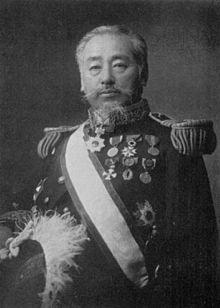Kuki Ryūichi
Appearance
You can help expand this article with text translated from the corresponding article in Japanese. (June 2019) Click [show] for important translation instructions.
|


Baron Kuki Ryūichi (九鬼 隆一, September 12, 1852 – August 18, 1931) was a samurai of provincial origin who is best known as the father of the Japanese philosopher Kuki Shūzō (九鬼 周造).
In the early years of the Meiji period, after studying under Fukuzawa Yukichi (福澤 諭吉), he took a post in the Japanese Ministry of Education, specializing in cultural policy. In 1884 he was appointed Japanese ambassador to the United States. Complications in his career arose when his wife Hatsu had an affair with Okakura Kakuzō (岡倉 覚三). He eventually returned to Japan where he continued to work in the Ministry of Education, and play a role as a patron of the arts.[1]
Honours
From the Japanese Wikipedia article
Japanese titles and decorations
- Grand Cordon of the Order of the Sacred Treasure (4 September 1895)
- Baron (5 June 1896)
- Grand Cordon of the Order of the Rising Sun (27 December 1902; Second Class: 29 May 1888; Third Class: 1 November 1882; Fourth Class: 27 December 1879)
- Grand Cordon of the Order of the Paulownia Flowers (18 August 1931; posthumous)
Japanese medals
- Imperial Constitution Promulgation Commemorative Medal (25 November 1889)
- Annexation of Korea Commemorative Medal (1 August 1912)
- Coronation commemorative medal (10 November 1915 and 10 November 1928)
Japanese court ranks
- Senior sixth rank (17 June 1874)
- Fifth rank (24 February 1875)
- Senior fifth rank (24 May 1880)
- Fourth rank (20 December 1880)
- Third rank (20 December 1886)
- Senior third rank (16 December 1890)
- Second rank (20 March 1900)
- Senior second rank (11 February 1924)
Other honours
- Knight of the Legion of Honour and Officer of the Order of Public Instruction of France (9 July 1879)
- Officer of the Order of the Crown of Italy (19 August 1879)
- Medal (1st Class) of the Order of the Crown of Hawa'ii (8 March 1890)
References
- ^ Leslie Pincus, Authenticating Culture in Imperial Japan, 1996
